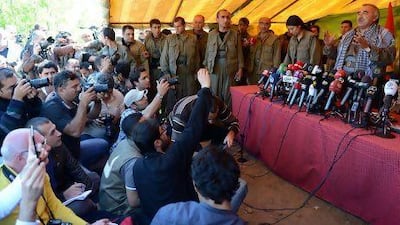ISTANBUL // A political solution to Turkey's conflict with Kurdish separatists would make the country a more active player in the Middle East, boost economic growth and change relations with Iraq and Syria, analysts said yesterday.
After months of talks between the Turkish state and the jailed rebel leader Abdullah Ocalan, his Kurdistan Workers' Party (PKK) said on Thursday it would start withdrawing its fighters from Turkey next month.
Analysts say Turkey has much to gain from ending the nearly 30-year conflict in which more than 40,000 people have been killed, although some have cautioned that the question of how to strengthen the rights of Turkey's 13 million Kurds, the main PKK demand in exchange for disarmament, is still unresolved.
But they said a solution would bolster Turkey's economy and strengthen its drive to become the leading power in the region.
"A democratic solution to the Kurdish conflict would add to Turkey's character as a model" for the rest of the region, said Veysel Ayhan, director of the International Middle East Peace Research Center, a think tank in Ankara.
"If it works, Turkey will become a major power in the Middle East. If it doesn't work, it will have missed a big opportunity," he said.
"Turkey's ability to deal with the conflict peacefully may constitute an example" to other countries with minority problems, said Ilter Turan, a political scientist at Istanbul's Bilgi University.
A foreign diplomat in Ankara, speaking on condition of anonymity, pointed out that Ahmet Davutoglu, the foreign minister, regarded economic development and a peaceful environment at home as preconditions for a stronger Turkish role abroad.
"Turkey will not sit tight" in foreign policy matters, even though the country is facing presidential, parliamentary and local elections in the next two years, with the Kurdish question expected to be one of the main campaign issues, the diplomat said.
Peace in south-eastern Anatolia could also change Turkey's relations with its neighbours. Ankara's already strong political and economic ties with the Kurdish Regional Government (KRG) in northern Iraq are set to grow further, said Cenap Cakmak, a political scientist at Osmangazi University in Eskisehir in western Turkey.
"Northern Iraq will become the natural partner of Turkey, even more than today," he said. Without the fighting on the Turkish side of the border and the regular Turkish military strikes against PKK camps in the mountains of northern Iraq, trade and cooperation would boom even more, he added.
"There is a huge potential," Mr Cakmak said.
Turkey's exports to northern Iraq have helped to make Iraq the second-biggest export market for Turkey. A recent report by Istanbul's Bahcesehir University said Iraq would replace Germany at the top spot within three years.
But at the same time, Ankara's close relations with the KRG have angered the central Iraqi government in Baghdad. Prof Turan, of Bilgi University, said further escalation was possible. In case of a military confrontation between Baghdad and the KRG, "Turkey will not hesitate to take the side of the KRG", he said.
Turkish-Kurdish reconciliation would also improve Ankara's relations with Kurds in Syria, Turkey's southern neighbour, Prof Turan said. Syria's Kurds, who make up about 10 per cent of Syria's population of 20 million, live mostly in regions close to the Turkish border.
In recent months, Ankara has accused Kurdish groups in Syria of siding with the PKK and with the government of Bashar Al Assad in its continuing conflict with opposition forces, which are supported by Ankara and others.
But a Kurdish peace deal at home would change Turkey's view on Kurds in Syria, Prof Turan said. Better relations with Syrian Kurds "would be a resource for Turkey in dealing with Damascus. And if there should be a new Syria, Turkey would have good relations with the Kurds there."

